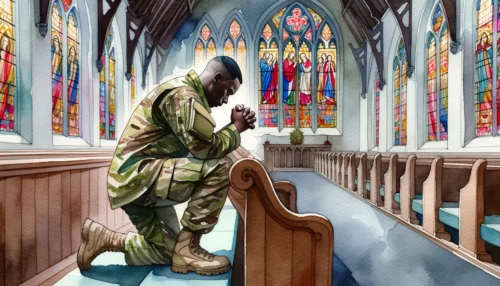As we walk through life, there are times when we are confronted with trials and tribulations that seem to defy our understanding of a just and loving God. This is especially perplexing when the good and the righteous among us are caught in the wake of suffering, pushing us to question, “Why does God allow bad things to happen to good people?” We aim to seek answers within the richness of Scripture, relying on Biblical principles and narratives to guide our understanding and to provide comfort and perspective in these difficult times.
The Mystery of God’s Sovereignty and Human Suffering
There is a profound mystery surrounding God’s sovereignty and human suffering, but we can gain insight from various Biblical narratives. These scriptures illuminate an important truth: God is utterly sovereign, meaning His authority and power are absolute. God controls every aspect of the universe He created (Psalm 135:6). Yet, within this omnipotence, He permits suffering, which often challenges our comprehension.
To grasp this, we need to comprehend God’s character and His plan for humanity. God is intrinsically good (Psalm 145:9). While suffering may seem contradictory to God’s goodness, it does not undermine His character. Instead, it is a part of His mysterious and perfect plan that transcends our limited understanding (Isaiah 55:8-9).
Before the fall of Adam and Eve, there was no suffering. But when they disobeyed God in the Garden of Eden, sin entered the world (Genesis 3). Consequently, humanity, even the most righteous, experiences suffering as a part of life in a fallen world. Suffering is not necessarily a direct punishment for personal sin, but rather an indirect consequence of the broader sinfulness of the world.
God’s sovereignty is intertwined with human free will, another significant factor in understanding why bad things happen to good people. God gave humanity the ability to choose, and unfortunately, these choices sometimes lead to pain and suffering (Deuteronomy 30:19-20). While God has control over all things, He does not author sin or suffering; rather, He permits it as a part of human free will and the fallen state of the world.
The presence of suffering should not be construed as evidence of God’s absence or indifference. In contrast, God is always present in the midst of suffering (Psalm 34:18). He feels our pain, shares in our sorrows, and promises to use even the most challenging situations for a greater good (Romans 8:28).
God’s sovereignty is complete, yet He allows suffering due to sin entering the world through Adam and Eve’s disobedience. The presence of suffering does not contradict God’s goodness, but instead forms part of His mysterious plan that exceeds our understanding. Human free will also plays a significant role, as the choices we make can lead to suffering. God remains present during times of pain and promises to use these situations for a greater purpose.
Learning through Trials: Biblical Examples
Examining biblical accounts, we find instances where God’s servants, individuals of remarkable righteousness, endure severe trials. Their stories offer valuable insights into the question at hand.
Job is one such character known for his trials. He was a man upright and blameless, yet he experienced great suffering. Job lost his wealth, his children, and his health in swift succession (Job 1-2). Despite his suffering, he maintained his integrity and faith, demonstrating that suffering isn’t necessarily indicative of personal sin. Job’s trials, while not punishments, served a purpose in God’s grand plan, ultimately leading to Job’s restoration and deepened understanding of God’s sovereignty (Job 42).
Joseph’s life provides another example. Despite being sold into slavery by his brothers and wrongfully imprisoned, Joseph maintained his faith (Genesis 37-39). Over time, his trials led him to a position of power in Egypt, where he preserved many lives during a famine, including those of his family. The suffering he experienced was part of a bigger picture, allowing God to use him in extraordinary ways (Genesis 50:20).
Jesus Christ, the epitome of righteousness, underwent the most profound suffering on the cross. His suffering wasn’t due to his sin—He was sinless—but for the salvation of humanity (1 Peter 2:24). Jesus’ suffering underscores the biblical truth that righteous individuals can experience suffering for reasons that serve God’s larger plan.
From these accounts, we see that trials can serve to refine faith, develop character, and fulfill God’s purposes. Suffering may be perplexing, but God can turn adversity into good, even if we don’t understand it during the trial.
Biblical narratives such as those of Job, Joseph, and Jesus illustrate that righteous individuals can endure trials. These trials aren’t necessarily due to personal sin, nor are they devoid of purpose. They often serve to deepen faith, mold character, and fulfill God’s larger plan. God has the ability to bring about good through adversity, a truth we can hold onto even when we face trials of our own.
Suffering and the Promise of Eternal Redemption
As we turn to the promise of eternal redemption, we gain a new perspective on suffering. The promise of eternal life in the presence of God provides a hopeful context to the trials and tribulations we face.
In the New Testament, the Apostle Paul presents a compelling perspective. He speaks about the temporal nature of our earthly trials compared to the eternal weight of glory that awaits us (2 Corinthians 4:17). He emphasizes the fleeting nature of our present struggles against the backdrop of the timeless joy and peace of our heavenly inheritance.
Our Savior Jesus Christ also conveys a message of hope amidst suffering. In His last moments on the cross, Jesus assures one of the criminals being crucified with Him about Paradise (Luke 23:43). This scene underscores the belief in redemption and eternal life, promising a realm where suffering no longer exists.
In the Book of Revelation, the Apostle John shares a vision of a new heaven and a new earth (Revelation 21:1). He describes a future where God will wipe away every tear, where death, mourning, crying, and pain will be no more. This is the promised eternal state for those who have faith, a place of perfect peace and joy in the presence of God.
These glimpses of eternity reveal that our earthly sufferings are but for a moment compared to the timeless existence that awaits us in God’s presence. The trials we face, while significant and often painful, are temporary. The promise of eternal redemption serves as a beacon of hope, encouraging us to endure faithfully, knowing that our present sufferings are not the end of our story.
The promise of eternal redemption provides a profound perspective on suffering. The New Testament teaches that our present trials are transient when compared to the eternal joy that awaits us. The assurance of a future where suffering is nonexistent brings hope. This belief undergirds our faith, encouraging us to persevere through our trials, knowing that these temporal struggles are but a prelude to the eternal joy and peace in God’s presence.
Steadfast Faith Amidst Trials
The complexities of human suffering often perplex us, especially when it affects those we deem good and righteous. Despite the mystery that shrouds this topic, we have sought to illuminate it through a biblical lens, affirming that God’s sovereignty, the refining nature of trials, and the promise of eternal redemption offer profound insights. In this light, we see that suffering, while uncomfortable and often heartbreaking, plays a part in the greater narrative that God is writing in our lives.
For personal reflection, consider these questions:
- How have your experiences with suffering impacted your faith?
- In times of trial, how can you cultivate a deeper trust in God’s sovereignty?
- How does the promise of eternal redemption bring you hope during periods of suffering?
May we, in the midst of our trials, remain anchored in our faith. Though we walk through valleys of uncertainty and hardship, may we be strengthened and inspired by the sure hope of God’s promises. For in this hope, we find the courage to endure, the strength to persevere, and the peace to face whatever comes our way.














